|
|
|
Sort Order |
|
|
|
Items / Page
|
|
|
|
|
|
|
| Srl | Item |
| 1 |
ID:
148503
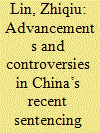

|
|
|
|
|
| Summary/Abstract |
This article discusses in detail the content and context of China’s recent sentencing reform and its social, political, and criminal justice implications, as well as its limitations. The focus of China’s criminal justice reforms over the past 37 years has been predominantly on the trial process; the sentencing process has been largely neglected. Revelations of widespread sentencing inconsistency led the Supreme People’s Court (SPC) to initiate sentencing reform in 2005. The intent of the reform was to promote transparency in the sentencing process, ensure consistency in sentencing dispositions, and guard against inappropriate judicial leniency and severity via new sentencing procedural rules and guidelines limiting judges’ sentencing discretion. In addition to discussing the new sentencing procedures and guidelines, this article also examines some hotly debated issues, including whether China’s sentencing process should be completely separate from the trial process; the meaning of ‘sentencing consistency’ in the context of China’s social and political development; and China’s unique sentencing principles in comparison with the practice of some English-speaking jurisdictions.
|
|
|
|
|
|
|
|
|
|
|
|
|
|
|
|
| 2 |
ID:
152428
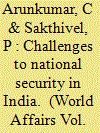

|
|
|
|
|
| Summary/Abstract |
There are numerous challenges to the national security of India and the extent and scope of threats are complex, varied and vast. C Arunkumar and P Sakthivel argue that if appropriate actions are not taken, the threats may result in the gradual degradation of the Indian state. They suggest a new set of policies and mechanisms in diverse arenas.
|
|
|
|
|
|
|
|
|
|
|
|
|
|
|
|
| 3 |
ID:
115211
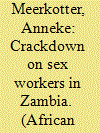

|
|
|
|
|
| Publication |
2012.
|
| Summary/Abstract |
In May 2012, Zambia's Inspector-General of Police announced a crackdown on sex workers. This commentary discusses the rationale behind this proposed crackdown and the problems associated with such a policy response.
|
|
|
|
|
|
|
|
|
|
|
|
|
|
|
|
| 4 |
ID:
125221


|
|
|
|
|
| Publication |
2013.
|
| Summary/Abstract |
A strange thing happened in Georgia last October. After an extremely contentious election season in which Bidzina Ivanishvili, the leader of the opposition, was stripped of his citizenship and fined millions of dollars, in which opposition activists were regularly harassed and arrested, and in which the media was dominated by the government, the opposition surprised many Western observers and governments by scoring a decisive victory and winning control of Parliament. Then an even stranger thing happened. The day after the election, the ruling party of Georgia, President Mikheil Saakashvili's United National Movement (UNM), gracefully conceded defeat to the new Prime Minister Ivanishvili's Georgian Dream (GD) coalition.
|
|
|
|
|
|
|
|
|
|
|
|
|
|
|
|
| 5 |
ID:
164009


|
|
|
| 6 |
ID:
122441
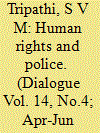

|
|
|
|
|
| Publication |
2013.
|
| Summary/Abstract |
Dignity of the individual was dear to the makers of our Constitution as
they had followed the torch lit by Mahatma Gandhi. All individuals,
especially the downtrodden, were considered as the manifestation of
Godhood by the Father of Nation. Consequently, in the very preamble
of our constitution, it was resolved to secure to all the citizens "Fraternity
assuring the dignity of the individual and the unity of the Nation." To
carry out this intention fully a number of fundamental rights were given
to individuals, some of them only bestowed on citizens of India. Barring
a few exceptions the fundamental rights function as limitation on the
State action. Sufficient provisions for protection against violation of
Human Rights by non-state players are incorporated in the ordinary
laws of the land. We have only to turn our eyes to some of our subcontinental neighbours to realize how important it is to protect the
individual against an unfettered State.
|
|
|
|
|
|
|
|
|
|
|
|
|
|
|
|
| 7 |
ID:
128437
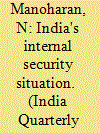

|
|
|
|
|
| Publication |
2013.
|
| Summary/Abstract |
Challenges to internal security of India are numerous. The extent and scope of threats are complex, varied and vast. No other country in the world confronts so many threats, with so much intensity, at the same time. Overall, more than 50 per cent of India is said to be affected by one or the other of these threats, which are not just 'law and order' problems. They have increasing external dimension falsifying conventional wisdom that internal security threats are caused mainly by internal sources. They threaten the body politic like a 'cancer'. The state of poor internal security situation is not because of India's unfavourable strategic environment but also due to weak internal security mechanism, especially its criminal justice system. In this context, the article argues that if appropriate actions are not taken, the threats may result in the gradual degradation of the Indian State. It suggests renewed set of policies and mechanisms in political, economic, socio-cultural, military and diplomatic arena.
|
|
|
|
|
|
|
|
|
|
|
|
|
|
|
|
| 8 |
ID:
171345


|
|
|
|
|
| Summary/Abstract |
Retrospective voting is vital for democracy. But, are the objective performance metrics widely thought to be relevant for retrospection—such as the performance of the economy, criminal justice system, and schools, to name a few—valid criteria for evaluating government performance? That is, do political coalitions actually have the power to influence the performance metrics used for retrospection on the timeline introduced by elections? Using difference-in-difference and regression discontinuity techniques, we find that US states governed by Democrats and those by Republicans perform equally well on economic, education, crime, family, social, environmental, and health outcomes on the timeline introduced by elections (2–4 years downstream). Our results suggest that voters may struggle to truly hold government coalitions accountable, as objective performance metrics appear to be largely out of the immediate control of political coalitions.
|
|
|
|
|
|
|
|
|
|
|
|
|
|
|
|
| 9 |
ID:
164004
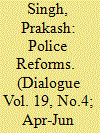

|
|
|
| 10 |
ID:
105202


|
|
|
|
|
| Publication |
2010.
|
| Summary/Abstract |
Contact with the criminal justice system is greater today than at any time in our history. In this article, we argue that interactions with criminal justice are an important source of political socialization, in which the lessons that are imprinted are antagonistic to democratic participation and inspire negative orientations toward government. To test this argument, we conduct the first systematic empirical exploration of how criminal justice involvement shapes the citizenship and political voice of a growing swath of Americans. We find that custodial involvement carries with it a substantial civic penalty that is not explained by criminal propensity or socioeconomic differences alone. Given that the carceral state has become a routine site of interaction between government and citizens, institutions of criminal justice have emerged as an important force in defining citizen participation and understandings, with potentially dire consequences for democratic ideals.
|
|
|
|
|
|
|
|
|
|
|
|
|
|
|
|
| 11 |
ID:
132745
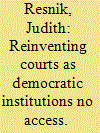

|
|
|
|
|
| Publication |
2014.
|
| Summary/Abstract |
Eighteenth-century constitutional commitments guaranteeing rights-to-remedies were shaped when members of the propertied classes were the prototypical litigants and governments' criminal justice systems were nascent. Twentieth-century egalitarian norms expanded the imagination of what justice could produce, and courts turned into sites of democracy. The particular and peculiar practices of adjudication produce, redistribute, and curb power among disputants who disagree in public about the import of legal rights. But new procedures-alternative dispute resolution (ADR)-encourage, and sometimes require, disputants to mediate or to arbitrate disputes privately as a predicate to or in lieu of using the public forum of courts. Some initiatives delegate adjudication to administrative tribunals, and others outsource binding decision-making to private providers. The resulting fragmentation and privatization of adjudication have profound implications for the newly minted democratic character of courts. The durability of courts as active and disciplined sites of public exchange ought not to be taken for granted. Like other venerable institutions of the eighteenth century-such as the postal service and the press, which served in parallel fashion to disseminate information and support democratic competency-courts are vulnerable.
|
|
|
|
|
|
|
|
|
|
|
|
|
|
|
|
| 12 |
ID:
151061


|
|
|
|
|
| Publication |
New Delhi, KW Publishers Pvt Ltd, 2017.
|
| Description |
xi, 278p.hbk
|
| Standard Number |
9789386288264
|
|
|
|
|
|
|
|
|
|
|
|
Copies: C:1/I:0,R:0,Q:0
Circulation
| Accession# | Call# | Current Location | Status | Policy | Location |
| 058953 | 322.420954/RAN 058953 | Main | On Shelf | General | |
|
|
|
|
| 13 |
ID:
152218
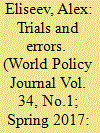

|
|
|
| 14 |
ID:
161126


|
|
|
|
|
| Summary/Abstract |
This article focuses on the systemic failures of the Nigerian police force to unravel the mysteries surrounding homicides in the country, along with the security, social and political implications of the ongoing trend. The article draws on documented pieces of evidence of high-profile murders, along with the causes of the upsurge in murder incidences and the inhibitive factors relating to the investigative procedures of the police. The suitability of the theory of subaltern realism and the concept of third-world security predicaments in explaining the peculiarities of Nigeria’s internal security challenges is examined, along with the problems of the legitimacy of political regimes and weak borders. There is a need for the National Assembly of Nigeria to exercise its constituted powers in reawakening and supervising investigations into dormant cases of murder through its committees on police affairs, public safety and national security. The police should check its organisational failures, which may be related to using the wrong investigative approaches, low levels of information, limited resources, corrupt practices, and pressure to obtain quick results.
|
|
|
|
|
|
|
|
|
|
|
|
|
|
|
|
|
|
|
|
|